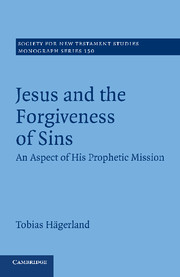Book contents
- Frontmatter
- Contents
- Tables
- Acknowledgements
- Abbreviations
- 1 Introduction
- 2 Forgiveness in the gospel tradition
- 3 Forgiveness and primitive Christian theology
- 4 Mediators of forgiveness in early Judaism
- 5 Forgiveness in the mission of the historical Jesus
- 6 Forgiveness from Jesus to the Gospels
- 7 Conclusion
- Bibliography
- Index of passages
- Index of modern authors
- Index of topics
- References
5 - Forgiveness in the mission of the historical Jesus
Published online by Cambridge University Press: 05 December 2011
- Frontmatter
- Contents
- Tables
- Acknowledgements
- Abbreviations
- 1 Introduction
- 2 Forgiveness in the gospel tradition
- 3 Forgiveness and primitive Christian theology
- 4 Mediators of forgiveness in early Judaism
- 5 Forgiveness in the mission of the historical Jesus
- 6 Forgiveness from Jesus to the Gospels
- 7 Conclusion
- Bibliography
- Index of passages
- Index of modern authors
- Index of topics
- References
Summary
The preceding chapters have brought this investigation to a point where it seems reasonable to surmise that the forgiveness sayings in Mark 2.5b and Luke 7.47a come from the historical Jesus, while the controversy in Mark 2.6–10 probably does not. In the present chapter, the argument will be bolstered by an appeal to the criteria of coherence and incoherence. There are, as we shall see, distinctive traits in a plausible overall reconstruction of the career of the historical Jesus, with which the announcement of forgiveness in Mark 2.5b and Luke 7.47a, so to speak, fit particularly well; conversely, there is tension between Mark 2.6–10 and an overall picture of the historical Jesus. In addition to authenticating the historicity of the sayings, I will also make an attempt at interpreting them within the larger framework of Jesus’ deeds and sayings.
I have singled out two prominent aspects of the mission of Jesus with which, as will be shown, Mark 2.5b and Luke 7.47a are positively coherent: his activity as a healer, and his identity (as expressed by himself and acknowledged by others) as a prophet. These two aspects are rarely questioned in historical Jesus research and have even been dubbed the two ‘bedrock facts’ about Jesus. They are also suggested by the narrative contexts of the forgiveness sayings and, to some extent, by their parallels in early Jewish texts. Mark 2.1–12 portrays Jesus as announcing forgiveness as part of a miraculous healing, and Luke 7.36–47 endows him with prophetic characteristics. The phenomenon of prophetic forgiveness in early Judaism was dealt with at length in Chapter 4, where I also discussed the conjunction of healing and forgiveness in the Prayer of Nabonidus. A deepened study of the career of Jesus as a healer and prophet can, in this light, be expected to provide an appropriate context for the understanding of his forgiveness announcements.
- Type
- Chapter
- Information
- Jesus and the Forgiveness of SinsAn Aspect of his Prophetic Mission, pp. 179 - 225Publisher: Cambridge University PressPrint publication year: 2011

